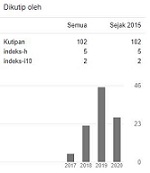STUDENT'S SPEAKING SKILL IN ENGLISH MATHEMATICS COURSES WITH MNEMONIC METHOD
Abstract
From the experience of the researchers while teaching the English Mathematics course, it was found that the main obstacle faced by students in communicating in English lies in their minimal vocabulary of English mathematical concepts. Departing from this fact, this study has two objectives, namely to find out how students respond to the application of the mnemonic method in English mathematics courses and the second is to find out students' speaking abilities, especially in remembering new vocabulary obtained from the learned mathematical concepts. Based on research data both in the form of written tests and interviews, it can be concluded that overall it is of good value. Student responses to the application of the mnemonic method in Mathematics English courses on the topic of Statistics and Opportunity are positive. Meanwhile, the students' English speaking ability in the application of the mnemonic method on the topic of Statistics and Opportunity includes 5 aspects as follows: for grammar mastery, a score of 20% of students obtained 3 points or very good category was obtained, for the vocabulary aspect, a score of 64% was obtained, which received a very good score. good, 48% who scored very well also in the comprehension mastery aspect. As for the fluency and pronunciation aspects, 40% were in the good category and 48% were in the very good category, respectively.
Keywords
References
Anggriyani, I. & Nurlina, A. (2021). Peningkatan Daya Ingat Siswa Terhadap Pembelajaran Matematika Dengan Penggunaan Teknik Mnemonic Pada Kelas XI Mas Al-Barakah. Jurnal Pembelajaran Matematika Inovatif, 4 (2). 657-666.
Buzan, Tony. (2008). Buku Pintar Mind Map untuk Anak: Agar Anak Lulus Ujian dengan Nilai Bagus. Jakarta: Gramedia Pustaka Utama.
Buzan, Tony. (2002). Use Your Perfect.tifemory. Teknik Optimalisasi Daya Ingest. Temuan Terkini Tentang Otak Manusia. Yogyakarta : Ikon Terelitera.
DePorter, B. & Hernacki. M. (2002). Membiasakan Belajar Nyaman dan Menyenangkan. Bnadung : Kaifa.
Firdaus, S. & Hafidah, S. (2020) Mnemonik : Solusi Kreatif Untuk Meningkatkan Kemampuan Menghafal Kosa Kata Bahasa Arab Siswi Madrasah Aliyah Nurul Jadid PALAPA : Jurnal Studi Keislaman dan Ilmu Pendidikan, 8 (1). 81-96.
Higbee, K. L. (2003). Mengasah Daya Ingat.20.Semarang : Dahara Prize.
Pasiak, T. (2003). Manajemen Kecerdasan Untuk Memberdayakan IQ, EQ, SQ untuk Kesuksesan Hidup. Bandung : Mizan.
SGM, Mr. (2008). Super Great Memory. Jakarta : Gramedia Pustaka Utama.
Stine, J. M. (2002). Double Your Brain Power. Meningkatkan Daya Ingat Anda dengan Menggunakan Seluruh Otak Anda. Jakarta : Gramedia.
Suharnan (2005). Psikologi Kognitif. Surabaya : Srikandi.
Turkington, C. (2005). Cara Mudah Memperbaiki Daya Ingat. Terjemahan Kandiana Ari M. Depok : Platinum.
Wojowasito, S. & Wasito, T. 1980. Kumus Lengkap Inggris – Indonesia Indonesia - Inggris dengan Ejaan yang Disempunakan. Bandung : Nasta.
Zaenuddin, A. & Khozinul. A. (2021). Metode Mnemonic: Solusi Kreatif Untuk Meningkatkan Pemahaman Nahwu Bagi Mahasiswa. Inovasi Media Pembelajaran Bahasa, Sastra, dan Budaya Arab . 2(1), 184-195.
DOI: 10.53712/ellite.v6i1.1767
Refbacks
- There are currently no refbacks.







